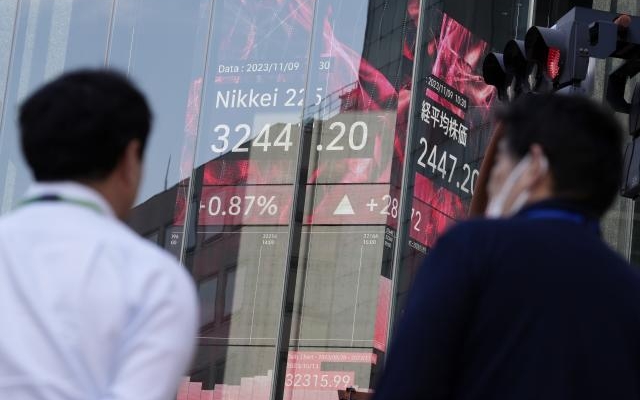Today’s News
On Monday, Asian stock markets got off on a cautious start as investors braced themselves for pivotal inflation data releases from the United States and Europe later in the week. Additionally, anticipation loomed over an impending meeting of oil producers which could potentially halt or extend the recent decline in oil prices.
The approach of month-end could trigger a degree of caution among investors, considering the substantial gains accumulated during November. Japan’s Nikkei index showed a 0.3% increase, reflecting a remarkable 9% surge so far in November.

Image Source: The Associated Press
The broadest index of Asia-Pacific shares tracked by MSCI, excluding Japan, maintained a flat trajectory, showcasing a substantial 6.7% increase for the month.
In the United States, S&P 500 futures slightly decreased by 0.1%, while Nasdaq futures experienced a 0.2% decline. The S&P 500 index has been on a four-week rally, marking an impressive 8.7% surge for the month, which would be its most robust performance since mid-2022.
Market attention turned towards the Federal Reserve’s favored inflation metric scheduled for release on Thursday, expected to reflect a slowdown to its lowest level since mid-2021, reinforcing market expectations that the next move in interest rates could potentially be downward.
Federal Reserve Chair Jerome Powell is set to address concerns during a Fireside Chat on Friday, having an opportunity to counter the dovish viewpoints. Additionally, several other Fed speakers are scheduled throughout the week, contributing to the ongoing market sentiment.
Bruce Kasman, JPMorgan’s head of global economics, strongly asserts, “Our firm belief is that central banks will probably not implement measures to ease monetary policy in the first half of 2024 unless there is a substantial threat to economic expansion or financial stability.”
Kasman further emphasizes, “In fact, this theme of exercising patience is likely to stand out prominently in forthcoming policy communications from developed markets in response to recent shifts in the financial markets.”
Oil Market Uncertainty
Meanwhile, the oil market experienced tension ahead of the delayed OPEC+ meeting scheduled for November 30. The meeting, originally planned for Sunday, faced postponement as producers grappled to reach a consensus.
Reports indicated that African oil producers are seeking higher caps for 2024, while Saudi Arabia may extend its additional 1 million bpd voluntary production cut, initially set to expire by the end of December.
This prevailing uncertainty influenced oil prices on Monday, with Brent edging up by 15 cents to reach USD 80.73 a barrel, while U.S. crude added 14 cents to settle at USD 75.68 per barrel.
Monetary Policy And Market Speculations
European Central Bank President Christine Lagarde has conveyed a sense of no urgency in implementing ease, and she is set to reinforce this message at the European Parliament later on Monday.
The forthcoming data on EU consumer prices for November, scheduled for release on Thursday, is anticipated to exhibit a decrease in both the headline and core rates. Such a trend would further support market expectations for potential rate cuts.
Market indicators reflect the anticipation of nearly 90 basis points of easing in the United States next year and approximately 83 basis points for the European Central Bank.
This anticipation of reduced borrowing costs has triggered a substantial rally in bonds, with yields on 10-year Treasuries declining by 37 basis points this month to 4.49%. Consequently, this has exerted downward pressure on the dollar, causing it to depreciate by 3% against a basket of major currencies this month.
On Monday, the euro registered an increase, reaching USD 1.0940, which was in close proximity to its recent four-month peak of USD 1.0965. Simultaneously, the dollar maintained stability, standing at 149.53 yen.
The decline in yields has served as a boost for non-yielding gold, which remained at USD 2,000 per ounce and was near its previous high in October of USD 2,009.29.
Other News
Australia Proposes Reserve Bank Overhaul
Australia intends to implement legislation creating a specialized Monetary Policy Board within the Reserve Bank, bolstering its independence and entrusting expert members with interest rate decisions, in line with recommendations from a recent review.
House Of Lords Urges Bank Of England Reforms
A House of Lords report demands reforms in the Bank of England’s culture, governance, and appointments processes following inflation failures. It stresses the need for diverse perspectives and greater parliamentary oversight for the bank’s performance.
China Launches Probe Into Shadow Bank Zhongzhi
China launches a probe into Zhongzhi, a major conglomerate in the country’s shadow financing market, after disclosing a substantial financial shortfall. The investigation raises concerns about the company’s role in China’s shadow financing sector amid economic uncertainties.



